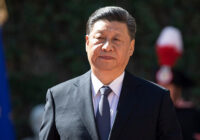Structural imbalances within the Saudi economy mean the country’s new strategy is only likely to partially achieve its aims.
The announcement of the new diversification strategy comes amid growing evidence of the severity of the economic crisis affecting Saudi Arabia. Official data from July showed the country fell into recession for the first time since the 1980s as cuts in government spending compounded the impact of the fall in oil prices. The construction industry, which relies heavily on state-funded infrastructure projects, has been especially badly affected, with tens of thousands of foreign construction workers left stranded having not received wages for up to eight months.
The deteriorating economic outlook has given fresh impetus to the government to consider economic reform, and in June, Riyadh unveiled the $72 billion National Transformation Program (NTP). The 110-page plan identifies the government’s key economic policies and targets for the five-year period from 2016-20, as part of the long-term economic blueprint laid out in the Vision 2030 agenda. The NTP seeks to transform the economy by privatizing state-owned assets such as ports and companies, including a 5% share of national oil company Saudi Aramco. Key sectors such as pharmaceuticals, information technology, tourism, construction and mining are also prioritized for investment.
Although the plan demonstrates a greater level of urgency on the part of the government to address the country’s structural economic challenges, more clarity on terms and regulations is necessary to attract investors. For example, Saudi Arabia has pledged to stimulate private-sector investment in the mining sector, but the government has not provided any specifics on promised regulatory changes or incentives for investors. Proposals to privatize state assets could also face local opposition over concerns that newly privatized firms will implement mass layoffs to trim bloated payrolls. Moreover, an historical lack of transparency at even well-regarded state enterprises such as Aramco may prove problematic for investors.
Businesses in Saudi Arabia will, however, benefit from planned bureaucratic and regulatory reforms, which will be less controversial than the privatization plans and far easier to implement. Saudi Arabia was ranked 82 out of 189 economies in the 2016 World Bank’s Ease of Doing Business Report and plans to move up the ranking to number 20 by 2020.
In order to achieve this, Saudi Arabia plans to resolve some of the most frequent complaints voiced by foreign investors, including the difficulty of securing visas and permits. The government also plans to reduce the time it takes to resolve commercial disputes and tackle other issues related to contract enforcement, another key concern. Reducing the cost and difficulty of securing government approvals and complying with local requirements in areas like employment law will be critical to the outlook for investment.
Non-oil sector to struggle despite renewed government vigor
Compared to previous diversification strategies, there is evidence of a more substantive commitment by the government to tackle its structural economic challenges. Each of the country’s 10 development plans announced since the 1970s has been unsuccessful in diversifying the economy. Earlier development programs lacked clear targets or mechanisms to stimulate the private sector, while politically difficult decisions, such as reducing subsidies and the public wage bill, have been avoided.
The NTP notably differs from past economic program in that it sets out 346 targets for government bodies and establishes units to monitor and track progress toward implementation. Cuts have also been made to costly subsidies on water and energy, though King Salman’s decision to remove the utilities minister in April after higher water prices sparked a public backlash underscores the sensitivity of the reforms and potential opposition to measures that impact living standards. The king further signaled his commitment to reform by reshuffling the cabinet in May to bring into government figures with proven commercial experience like Labor Minister Adel Fakeih, former chairman of food company Savola Group.
Despite the positive intent demonstrated by changes announced to date, the non-oil sector of the economy is likely to grow slowly in the coming years. The private sector’s dependence on state contracts and spending has been a key sticking point of past efforts to diversify the economy, and the non-oil sector has consequently suffered as the government cut planned spending by 14% in its 2016 budget. Local profits have been reduced by government austerity at the same time that economic disruption has limited the ability of Saudi firms to raise financing from banks.
The government has said the private sector would fund around 40% of financing, or $48 billion, for key projects such as new schools and power plants, but new taxes, fees and subsidy cuts will raise costs for local operators. Foreign investment will help to ameliorate the impact of this, but the ultimate level of interest will be determined by the specific terms and progress in resolving regulatory barriers.
Political, structural risks to reforms
The bureaucratic and personnel changes are indicative of the strong support for the economic program at the highest levels, most notably by Deputy Crown Prince Mohammed bin Salman who has led the reform effort as its chief architect and champion. The plan represents the biggest economic restructuring effort since the country’s founding, a move that risks upsetting traditional centers of power in the bureaucracy, royal family and clerical establishments. Prince Mohammed’s foreign and domestic policies have provoked criticism from other members of the ruling family, and his own lack of support within the ruling elite has the potential to leave him and his economic agenda isolated.
Progress in diversifying the economy will thus remain vulnerable to changes in the domestic political environment or resistance from vested political interests and conservative clerics who oppose liberalization.
Structural imbalances such as those in the labor force will remain, limiting the growth of the private sector. Less than 20% of all employees in the private sector are Saudi nationals, a figure that reflects the poor quality of local education and a persistent mismatch in skills and training. In polling and employment, Saudis have also indicated their preference for less-onerous and more generous government positions. These structural challenges are unlikely to be reversed in the medium term, and the private sector will face greater pressure from the government to hire locals as the state seeks to trim spending on wages. While the failure to meet targets over the employment of local nationals could expose businesses to regulatory scrutiny, companies will likely struggle to recruit local workers with the necessary skills.
Weak economic conditions will also persist, resulting in a bleak outlook for the employment of foreign laborers in key sectors such as construction. In May, the region’s largest construction firm, the Binladin Group, laid off up to 77,000 expatriate employees, many of whom had not been paid for months. The failure to pay wages and difficulties in securing exit visas have contributed to intermittent episodes of civil unrest. Although the overall threat from protest in Saudi Arabia remains moderate, a demonstration by hundreds of construction workers in June disrupted traffic in Jeddah, while in May laborers set fire to Binladin Group property in Mecca. Mounting frustration over local conditions could manifest in more frequent and disruptive protests without government intervention.
*[This article is based on a report by Protection Group International.]
The views expressed in this article are the author’s own and do not necessarily reflect Fair Observer’s editorial policy.
Photo Credit: Abalcazar
 We bring you perspectives from around the world. Help us to inform and educate. Your donation is tax-deductible. Join over 400 people to become a donor or you could choose to be a sponsor.
We bring you perspectives from around the world. Help us to inform and educate. Your donation is tax-deductible. Join over 400 people to become a donor or you could choose to be a sponsor.
Support Fair Observer
We rely on your support for our independence, diversity and quality.
For more than 10 years, Fair Observer has been free, fair and independent. No billionaire owns us, no advertisers control us. We are a reader-supported nonprofit. Unlike many other publications, we keep our content free for readers regardless of where they live or whether they can afford to pay. We have no paywalls and no ads.
In the post-truth era of fake news, echo chambers and filter bubbles, we publish a plurality of perspectives from around the world. Anyone can publish with us, but everyone goes through a rigorous editorial process. So, you get fact-checked, well-reasoned content instead of noise.
We publish 2,500+ voices from 90+ countries. We also conduct education and training programs
on subjects ranging from digital media and journalism to writing and critical thinking. This
doesn’t come cheap. Servers, editors, trainers and web developers cost
money.
Please consider supporting us on a regular basis as a recurring donor or a
sustaining member.
Will you support FO’s journalism?
We rely on your support for our independence, diversity and quality.






